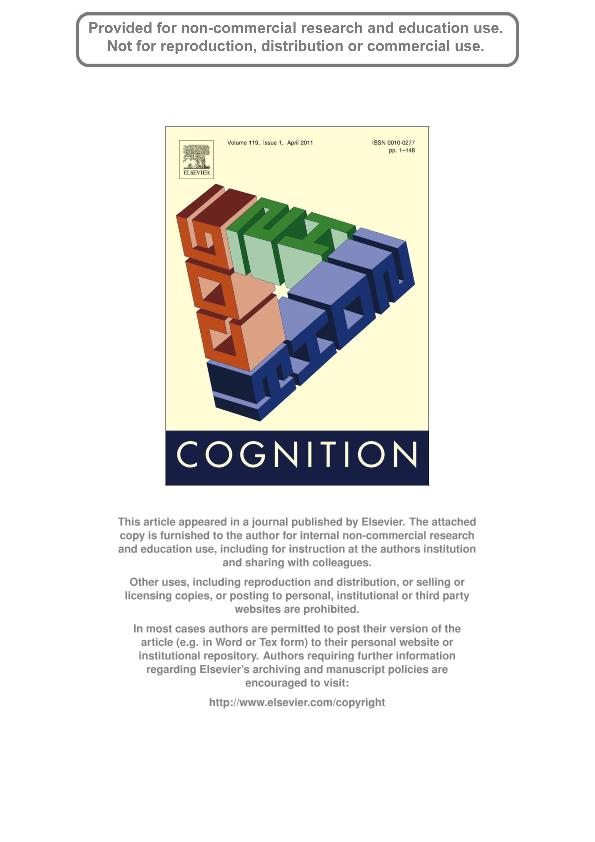Mostrar el registro sencillo del ítem
dc.contributor.author
Kamienkowski, Juan Esteban

dc.contributor.author
Pashler, Harold
dc.contributor.author
Dehaene, Stanislas

dc.contributor.author
Sigman, Mariano

dc.date.available
2018-08-27T15:59:44Z
dc.date.issued
2011-04
dc.identifier.citation
Kamienkowski, Juan Esteban; Pashler, Harold; Dehaene, Stanislas; Sigman, Mariano; Effects of practice on task architecture: Combined evidence from interference experiments and random-walk models of decision making; ELSERVIER; Cognition; 119; 1; 4-2011; 81-95
dc.identifier.issn
0010-0277
dc.identifier.uri
http://hdl.handle.net/11336/57190
dc.description.abstract
Does extensive practice reduce or eliminate central interference in dual-task processing? We explored the reorganization of task architecture with practice by combining interference analysis (delays in dual-task experiment) and random-walk models of decision making (measuring the decision and non-decision contributions to RT). The main delay observed in the Psychologically Refractory Period at short stimulus onset asynchronies (SOA) values was largely unaffected by training. However, the range of SOAs over which this interference regime held diminished with learning. This was consistent with an overall shift observed in single-task performance from a highly variable decision time to a reliable (non-decision time) contribution to response time. Executive components involved in coordinating dual-task performance decreased (and became more stable) after extensive practice. The results suggest that extensive practice reduces the duration of central decision stages, but that the qualitative property of central seriality remains a structural invariant. © 2010 Elsevier B.V.
dc.format
application/pdf
dc.language.iso
eng
dc.publisher
ELSERVIER
dc.rights
info:eu-repo/semantics/openAccess
dc.rights.uri
https://creativecommons.org/licenses/by-nc-sa/2.5/ar/
dc.subject
Cognitive Processes
dc.subject
Dual-Task Performance
dc.subject
Learning
dc.subject
Psychological Refractory Period
dc.subject
Response Time Distributions
dc.subject
Task Architecture
dc.title
Effects of practice on task architecture: Combined evidence from interference experiments and random-walk models of decision making
dc.type
info:eu-repo/semantics/article
dc.type
info:ar-repo/semantics/artículo
dc.type
info:eu-repo/semantics/publishedVersion
dc.date.updated
2018-08-24T13:35:04Z
dc.journal.volume
119
dc.journal.number
1
dc.journal.pagination
81-95
dc.journal.pais
Países Bajos

dc.journal.ciudad
Amsterdam
dc.description.fil
Fil: Kamienkowski, Juan Esteban. Consejo Nacional de Investigaciones Científicas y Técnicas. Oficina de Coordinación Administrativa Ciudad Universitaria. Instituto de Física de Buenos Aires. Universidad de Buenos Aires. Facultad de Ciencias Exactas y Naturales. Instituto de Física de Buenos Aires; Argentina
dc.description.fil
Fil: Pashler, Harold. University of California at San Diego; Estados Unidos
dc.description.fil
Fil: Dehaene, Stanislas. College de France; . Inserm; Francia
dc.description.fil
Fil: Sigman, Mariano. Consejo Nacional de Investigaciones Científicas y Técnicas. Oficina de Coordinación Administrativa Ciudad Universitaria. Instituto de Física de Buenos Aires. Universidad de Buenos Aires. Facultad de Ciencias Exactas y Naturales. Instituto de Física de Buenos Aires; Argentina
dc.journal.title
Cognition
dc.relation.alternativeid
info:eu-repo/semantics/altIdentifier/doi/http://dx.doi.org/10.1016/j.cognition.2010.12.010
Archivos asociados
